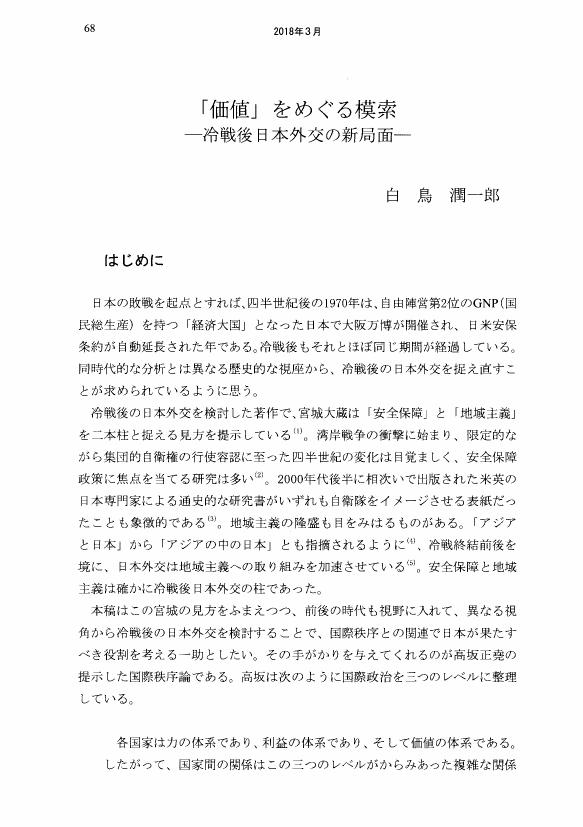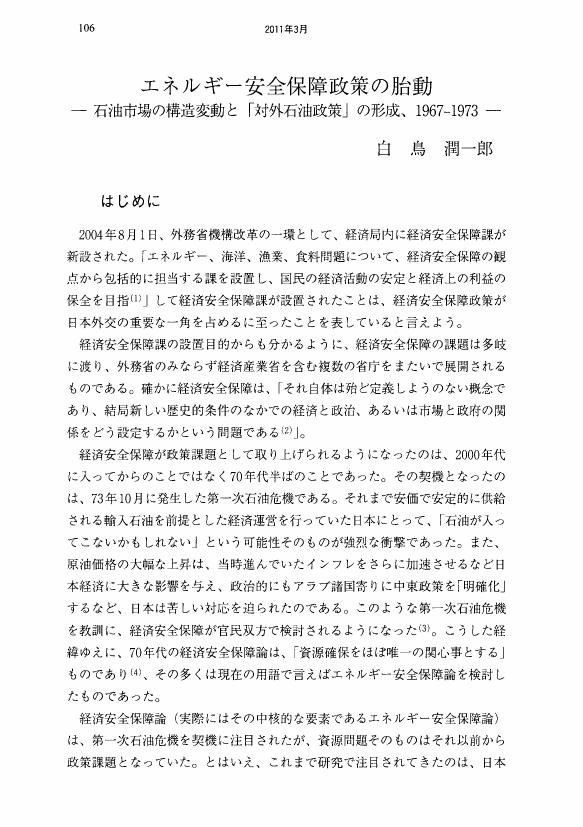27 0 0 0 OA 「戦後処理」からの脱却を目指して : 高度経済成長期の外務省機構改革
- 著者
- 白鳥 潤一郎
- 出版者
- 北海道大学大学院法学研究科 = Hokkaido University, School of Law
- 雑誌
- 北大法学論集 (ISSN:03855953)
- 巻号頁・発行日
- vol.65, no.5, pp.87-136, 2015-01-30
12 0 0 0 OA 外務省経済局「第五回主要国首脳会議議事録」
- 著者
- 白鳥 潤一郎 シラトリ ジュンイチロウ Junichiro Shiratori
- 雑誌
- 立教法学
- 巻号頁・発行日
- vol.96, pp.104-31, 2017-12-15
- 著者
- 白鳥 潤一郎
- 出版者
- 国際安全保障学会 ; 2001-
- 雑誌
- 国際安全保障 (ISSN:13467573)
- 巻号頁・発行日
- vol.45, no.4, pp.68-85, 2018-03
6 0 0 0 OA 国際エネルギー機関の設立と日本外交
- 著者
- 白鳥 潤一郎
- 出版者
- 財団法人 日本国際政治学会
- 雑誌
- 国際政治 (ISSN:04542215)
- 巻号頁・発行日
- vol.2010, no.160, pp.160_17-33, 2012-03-25 (Released:2012-06-15)
- 参考文献数
- 89
The aim of this article is to examine the role of Japanese diplomacy in bringing cooperative relationship among oil-consumers, and how it led to the establishment of the International Energy Agency (IEA) in November 1974 after the First Oil Crisis (FOC). The foundation of the IEA has an epoch-making significance in itself, as this institution provided a platform in which long-term policy cooperation among oil consumers could be designed and implemented. The IEA obligates signatory states to stockpile a designated certain amount of oil reserves, and it also specifies the Oil Emergency Sharing System in the agreement. This represents an effort for advanced countries seeking cooperation while the postwar international economic order was undergoing to serious changes.Most works on Japanese diplomacy dealing with the FOC period have tended to focus on Japan's stance toward the Middle East. They generally emphasize highlight the anxiety within the government to secure a stable supply of oil as the principal reason for Japan eventually swinging toward pro-Arab policy. However, such narratives do not provide us with a whole picture, since the FOC was not only brought by Arab oil embargo. If we were to fully grasp the underlying cause of Japan's policy behavior in the FOC, we must first take into account a structural change in the international oil market since the late 1960s resulting from the strengthening of oil-producers. In the same vein, it is equally crucial to analyze how the oil consumers in general responded to the oil producers united under the Organization of the Petroleum Exporting Countries (OPEC).After the FOC, cooperation among oil consumer states intensified with Washington Energy Conference in February 1974, and Japan was an active participant during the process. In fact, the Japanese government was the first to announce its intention to participate in the conference. It also actively took part in Energy Coordination Group (ECG) following the Washington Energy Conference, and facilitated ECG in playing a moderating role between Great Britain and West Germany.Japan actively participated in these institutional frameworks since the policymakers shared two perceptions. The first is the recognition that the oil consumers, in order to decrease their vulnerability in oil supply, must unite. The second perception is that it is important for Japan to support the maintenance of a liberal international economic order which would ensure the stable flow of oil supplies. Seen from this context, the Japanese participation in the establishment of the IEA from the first stage is a drastic deviation from past diplomatic practice of passively joining already-existing international organizations. Although Japan's role in G7 for facilitating international cooperation among advanced countries is better known, it is significant to notice that Japan's early participation in establishing cooperative framework in the aftermath of the FOC is the true turning point.
- 著者
- 松浦 正孝 保城 広至 空井 護 白鳥 潤一郎 中北 浩爾 浅井 良夫 石川 健治 砂原 庸介 満薗 勇 孫 斉庸 溝口 聡 加藤 聖文 河崎 信樹 小島 庸平 軽部 謙介 小野澤 透 小堀 聡
- 出版者
- 立教大学
- 雑誌
- 基盤研究(A)
- 巻号頁・発行日
- 2018-04-01
「戦後体制」の何が戦前・戦時と異なり、どのような新たな体制を築いたのか。それはその後どのような変遷をたどり、どこでどう変わって現在に至ったのか。本研究は、その解明のために異分野(政治史、外交史、政治学、憲法学、経済史)の若手・中堅の最先端研究者を集めた多分野横断による問題発見型プロジェクトである。初めの2年度は、各メンバーの業績と学問背景をより深く理解し「戦後」についての問題を洗い出すため、毎回2名ずつの主要業績をテキストとする書評会と、その2名が それぞれ自分野における「戦後」をめぐる 時期区分論と構造について報告する研究会を、年4回開くこととした。しかるにコロナ禍の拡大により、第2年度目最後の2019年3月、京都の会議施設を何度も予約しながら対面式研究会のキャンセルを余儀なくされた。しかし20年度に入ると研究会をオンラインで再開することとし、以後、オンライン研究会を中心に共同研究を進めた。コロナ禍による遅れを取り戻すべく、20年7月・8月・9月と毎月研究会を行い、与党連立政権、貿易・為替システム、消費者金融などのテーマについてメンバーの業績を中心に討議を行った。オリジナル・メンバーの間での相互理解と共通認識が深まったため、12月にはゲスト3名をお招きして、戦犯・遺骨収集・旧軍人特権の戦後処理問題を扱うと共に、メンバーによる復員研究の書評会を行った。「家族」という重要テーマの第一人者である倉敷伸子氏にも、新たにプロジェクトに加わって頂いた。この間、メンバーの数名を中心に今後の研究方針案を調整した上で、21年3月には3日間にわたり「編集全体会議」を開催した。後半2年間に行うべき成果のとりまとめ方針を話し合うと共に、憲法・経済史・労働史・現代史の新メンバー加入を決め、各メンバーが取り組むテーマを報告し議論した。また、各メンバーは各自で本プロジェクトの成果を発表した。
2 0 0 0 OA 「価値」をめぐる模索 ―冷戦後日本外交の新局面―
- 著者
- 白鳥 潤一郎
- 出版者
- 国際安全保障学会
- 雑誌
- 国際安全保障 (ISSN:13467573)
- 巻号頁・発行日
- vol.45, no.4, pp.68-85, 2018-03-31 (Released:2022-04-01)
2 0 0 0 IR 「戦後処理」からの脱却を目指して : 高度経済成長期の外務省機構改革
- 著者
- 白鳥 潤一郎
- 出版者
- 北海道大学大学院法学研究科 = Hokkaido University, School of Law
- 雑誌
- 北大法学論集 (ISSN:03855953)
- 巻号頁・発行日
- vol.65, no.5, pp.1213-1262, 2015
- 著者
- 白鳥 潤一郎
- 出版者
- JAPAN ASSOCIATION OF INTERNATIONAL RELATIONS
- 雑誌
- 国際政治 (ISSN:04542215)
- 巻号頁・発行日
- vol.2014, no.175, pp.175_164-175_167, 2014
- 著者
- 白鳥 潤一郎
- 出版者
- 一般財団法人 日本国際政治学会
- 雑誌
- 国際政治 (ISSN:04542215)
- 巻号頁・発行日
- vol.2014, no.175, pp.175_164-175_167, 2014
- 著者
- 白鳥 潤一郎
- 出版者
- 国際安全保障学会
- 雑誌
- 国際安全保障 (ISSN:13467573)
- 巻号頁・発行日
- vol.43, no.3, pp.86-90, 2015-12-31 (Released:2022-04-01)
- 著者
- 白鳥 潤一郎
- 出版者
- 国際安全保障学会
- 雑誌
- 国際安全保障 (ISSN:13467573)
- 巻号頁・発行日
- vol.38, no.4, pp.106-123, 2011-03-31 (Released:2022-04-14)
- 著者
- 白鳥 潤一郎
- 出版者
- JAPAN ASSOCIATION OF INTERNATIONAL RELATIONS
- 雑誌
- 国際政治 (ISSN:04542215)
- 巻号頁・発行日
- vol.2010, no.160, pp.160_17-33, 2012
The aim of this article is to examine the role of Japanese diplomacy in bringing cooperative relationship among oil-consumers, and how it led to the establishment of the International Energy Agency (IEA) in November 1974 after the First Oil Crisis (FOC). The foundation of the IEA has an epoch-making significance in itself, as this institution provided a platform in which long-term policy cooperation among oil consumers could be designed and implemented. The IEA obligates signatory states to stockpile a designated certain amount of oil reserves, and it also specifies the Oil Emergency Sharing System in the agreement. This represents an effort for advanced countries seeking cooperation while the postwar international economic order was undergoing to serious changes.<br>Most works on Japanese diplomacy dealing with the FOC period have tended to focus on Japan's stance toward the Middle East. They generally emphasize highlight the anxiety within the government to secure a stable supply of oil as the principal reason for Japan eventually swinging toward pro-Arab policy. However, such narratives do not provide us with a whole picture, since the FOC was not only brought by Arab oil embargo. If we were to fully grasp the underlying cause of Japan's policy behavior in the FOC, we must first take into account a structural change in the international oil market since the late 1960s resulting from the strengthening of oil-producers. In the same vein, it is equally crucial to analyze how the oil consumers in general responded to the oil producers united under the Organization of the Petroleum Exporting Countries (OPEC).<br>After the FOC, cooperation among oil consumer states intensified with Washington Energy Conference in February 1974, and Japan was an active participant during the process. In fact, the Japanese government was the first to announce its intention to participate in the conference. It also actively took part in Energy Coordination Group (ECG) following the Washington Energy Conference, and facilitated ECG in playing a moderating role between Great Britain and West Germany.<br>Japan actively participated in these institutional frameworks since the policymakers shared two perceptions. The first is the recognition that the oil consumers, in order to decrease their vulnerability in oil supply, must unite. The second perception is that it is important for Japan to support the maintenance of a liberal international economic order which would ensure the stable flow of oil supplies. Seen from this context, the Japanese participation in the establishment of the IEA from the first stage is a drastic deviation from past diplomatic practice of passively joining already-existing international organizations. Although Japan's role in G7 for facilitating international cooperation among advanced countries is better known, it is significant to notice that Japan's early participation in establishing cooperative framework in the aftermath of the FOC is the true turning point.
- 著者
- 白鳥 潤一郎
- 出版者
- 一般財団法人 日本国際政治学会
- 雑誌
- 国際政治 (ISSN:04542215)
- 巻号頁・発行日
- vol.2010, no.160, pp.160_17-33, 2012
The aim of this article is to examine the role of Japanese diplomacy in bringing cooperative relationship among oil-consumers, and how it led to the establishment of the International Energy Agency (IEA) in November 1974 after the First Oil Crisis (FOC). The foundation of the IEA has an epoch-making significance in itself, as this institution provided a platform in which long-term policy cooperation among oil consumers could be designed and implemented. The IEA obligates signatory states to stockpile a designated certain amount of oil reserves, and it also specifies the Oil Emergency Sharing System in the agreement. This represents an effort for advanced countries seeking cooperation while the postwar international economic order was undergoing to serious changes.<br>Most works on Japanese diplomacy dealing with the FOC period have tended to focus on Japan's stance toward the Middle East. They generally emphasize highlight the anxiety within the government to secure a stable supply of oil as the principal reason for Japan eventually swinging toward pro-Arab policy. However, such narratives do not provide us with a whole picture, since the FOC was not only brought by Arab oil embargo. If we were to fully grasp the underlying cause of Japan's policy behavior in the FOC, we must first take into account a structural change in the international oil market since the late 1960s resulting from the strengthening of oil-producers. In the same vein, it is equally crucial to analyze how the oil consumers in general responded to the oil producers united under the Organization of the Petroleum Exporting Countries (OPEC).<br>After the FOC, cooperation among oil consumer states intensified with Washington Energy Conference in February 1974, and Japan was an active participant during the process. In fact, the Japanese government was the first to announce its intention to participate in the conference. It also actively took part in Energy Coordination Group (ECG) following the Washington Energy Conference, and facilitated ECG in playing a moderating role between Great Britain and West Germany.<br>Japan actively participated in these institutional frameworks since the policymakers shared two perceptions. The first is the recognition that the oil consumers, in order to decrease their vulnerability in oil supply, must unite. The second perception is that it is important for Japan to support the maintenance of a liberal international economic order which would ensure the stable flow of oil supplies. Seen from this context, the Japanese participation in the establishment of the IEA from the first stage is a drastic deviation from past diplomatic practice of passively joining already-existing international organizations. Although Japan's role in G7 for facilitating international cooperation among advanced countries is better known, it is significant to notice that Japan's early participation in establishing cooperative framework in the aftermath of the FOC is the true turning point.


